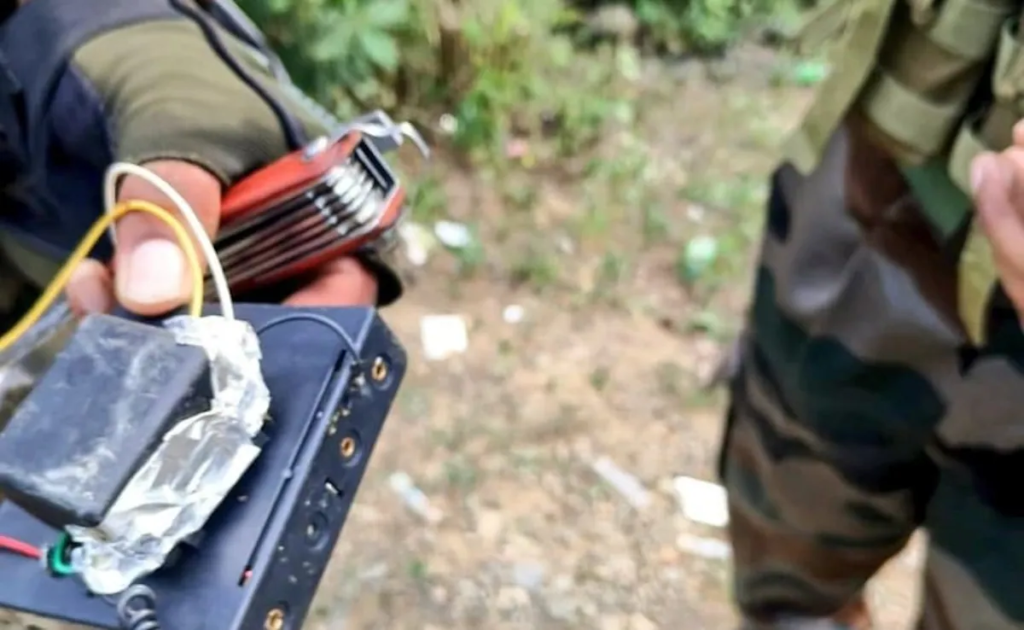Army Defuses Three Bombs Planted
Overview
New Delhi: The Indian Army successfully defused three improvised explosive devices (IEDs) in the Imphal East district of Manipur, a defence spokesperson confirmed today. The discovery and subsequent neutralization of these bombs underscore the ongoing security challenges in the region.
Location and Discovery
The IEDs were strategically concealed on a road connecting the villages of Nongdam and Itham, which are approximately 46 kilometers apart. This section of the road is in proximity to the Maphou dam and Nongdam village, making it a critical route for local transportation and military operations.
During a routine area-domination and surveillance operation, army personnel observed the suspicious objects placed in a sequential manner along the road. Recognizing the potential threat, the army column acted with urgency, promptly cordoning off the area to secure it from any potential harm.

The Operation
The defusal operation was meticulously planned and executed. Upon discovering the IEDs, the army immediately implemented standard operating procedures to ensure the safety of nearby residents and the personnel involved in the operation. A bomb disposal squad was called in to handle the situation with expertise.
The IEDs were carefully examined using advanced detection equipment. The bomb disposal experts employed a combination of remote and manual techniques to disarm the devices, ensuring that no harm came to the surrounding area or the soldiers involved. The successful neutralization of the bombs was a testament to the army’s preparedness and capability in handling such threats.
Security Implications
The discovery of these IEDs highlights the persistent security issues in Manipur, a region that has been grappling with insurgency and militant activities for decades. The use of IEDs by insurgents poses a significant threat to both civilians and security forces. These devices are often employed to disrupt peace, instill fear, and challenge the authority of the state.
Background on Manipur’s Security Situation
Manipur, a northeastern state of India, has been a hotspot for insurgent activities for many years. Various militant groups operate in the region, each with different demands and ideologies. These groups often resort to violence, including the use of IEDs, to further their objectives.
The terrain of Manipur, characterized by its hilly landscape and dense forests, provides a conducive environment for insurgents to carry out guerrilla warfare. The state’s geographical location, sharing borders with Myanmar, also complicates the security dynamics, facilitating the smuggling of arms and explosives.
The Role of the Indian Army
The Indian Army plays a crucial role in maintaining security and stability in Manipur. Regular patrols, area-domination operations, and intelligence-driven missions are part of the army’s strategy to counter insurgency and prevent militant activities. The army works closely with local law enforcement agencies and other paramilitary forces to ensure a coordinated response to threats.
The successful defusal of the IEDs in Imphal East district is a reflection of the army’s vigilance and commitment to safeguarding the region. Such operations are essential to maintaining the confidence of the local population and deterring insurgent activities.
Impact on Local Communities
The presence of IEDs and other explosive devices poses a significant risk to local communities. These threats disrupt daily life, instill fear, and hinder economic activities. The successful defusal of the bombs by the army not only ensures the immediate safety of the residents but also helps in restoring a sense of normalcy.
Local communities often bear the brunt of insurgency-related violence. In this context, the army’s efforts to neutralize threats and engage with the populace are vital. Community outreach programs, combined with security operations, help in building trust and cooperation between the army and the residents.
Preventive Measures and Future Steps
The defusal of the IEDs serves as a reminder of the need for continued vigilance and preventive measures. Enhanced surveillance, intelligence gathering, and community engagement are essential components of a comprehensive security strategy.
- Surveillance and Intelligence: The use of advanced surveillance technologies, including drones and satellite imagery, can enhance the army’s ability to detect and monitor suspicious activities. Intelligence sharing between different security agencies is crucial for preempting threats.
- Community Engagement: Building strong relationships with local communities is essential. Informing and educating residents about the dangers of IEDs and encouraging them to report suspicious activities can significantly aid in preventing such incidents.
- Training and Preparedness: Continuous training and drills for bomb disposal squads and other security personnel ensure that they are well-prepared to handle explosive threats. Regular updates on the latest techniques and technologies in bomb disposal are also important.
- Infrastructure Development: Improving infrastructure, such as roads and communication networks, can aid in faster response times and better coordination during security operations.
- International Cooperation: Given the transnational nature of some insurgent activities, international cooperation, especially with neighboring countries like Myanmar, is crucial. Collaborative efforts in intelligence sharing and border management can help in curbing the smuggling of arms and explosives.
Conclusion
The defusal of three IEDs in Manipur’s Imphal East district by the Indian Army is a significant achievement in the ongoing efforts to maintain security in the region. This incident highlights the persistent threat posed by insurgent activities and the need for continued vigilance and preparedness.
The Indian Army’s swift and effective response not only ensured the safety of the local population but also reaffirmed its commitment to combating insurgency in Manipur. Through a combination of advanced surveillance, community engagement, and international cooperation, the army continues to play a pivotal role in ensuring the region’s stability and security.
